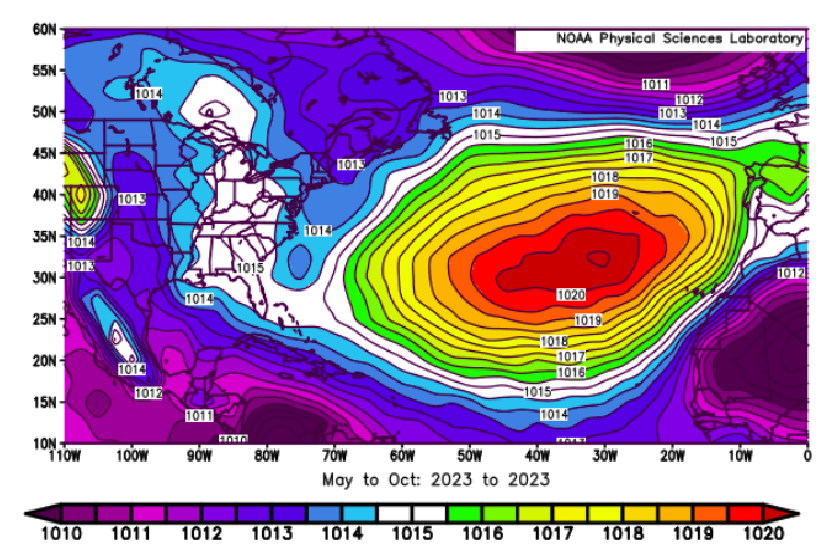Estado del Clima en Cuba 2023. Resumen ampliado.
Contenido principal del artículo
Resumen
Se analizan en este reporte los principales indicadores que caracterizan el clima de Cuba así como algunos factores que regulan su variabilidad en la región. Se incluyen además algunos de los fenómenos meteorológicos y climáticos extremos que son de alto impacto en Cuba como la sequía, ciclones tropicales y extremos por calor. Resultan particularmente importante variables como la temperatura y la lluvia. Como principal factor modulador del clima, aunque no es el único, se incluye el comportamiento del evento el Niño - Oscilación del Sur (ENOS) durante el 2023. Toda la información es referida a la normal climatológica estándar 1991-2020, con lo que es posible comparar observaciones recientes o actuales así como el cálculo de las desviaciones o anomalías de un valor respecto a ese valor de referencia. No obstante, en ocasiones, se utiliza el periodo 1961-1990, recomendado por la OMM (2017), para evaluar los cambios de temperatura a largo plazo y en el caso de las condiciones bioclimáticas se empleó como período de referencia la normal climatologica 1981-2010.
Descargas
Detalles del artículo

Esta obra está bajo licencia internacional Creative Commons Reconocimiento-NoComercial 4.0.
Aquellos autores/as que tengan publicaciones con esta revista, aceptan los términos siguientes de la Licencia CC Reconocimiento-NoComercial 4.0 Internacional (CC BY-NC 4.0):
Usted es libre de:
- Compartir — copiar y redistribuir el material en cualquier medio o formato
- Adaptar — remezclar, transformar y crear a partir del material
El licenciador no puede revocar estas libertades mientras cumpla con los términos de la licencia.
Bajo las condiciones siguientes:
- Reconocimiento — Debe reconocer adecuadamente la autoría, proporcionar un enlace a la licencia e indicar si se han realizado cambios. Puede hacerlo de cualquier manera razonable, pero no de una manera que sugiera que tiene el apoyo del licenciador o lo recibe por el uso que hace.
- NoComercial — No puede utilizar el material para una finalidad comercial.
- No hay restricciones adicionales — No puede aplicar términos legales o medidas tecnológicas que legalmente restrinjan realizar aquello que la licencia permite.
La revista no se responsabiliza con las opiniones y conceptos emitidos en los trabajos, son de exclusiva responsabilidad de los autores. El Editor, con la asistencia del Comité de Editorial, se reserva el derecho de sugerir o solicitar modificaciones aconsejables o necesarias. Son aceptados para publicar trabajos científico originales, resultados de investigaciones de interés que no hayan sido publicados ni enviados a otra revista para ese mismo fin.
La mención de marcas comerciales de equipos, instrumentos o materiales específicos obedece a propósitos de identificación, no existiendo ningún compromiso promocional con relación a los mismos, ni por los autores ni por el editor.
Citas
Barcia-Sardiñas, S.; Hernández-González, D.; Velázquez Zaldívar, B. & Armas-Forteza, O. 2020. Comportamiento de las condiciones de calor o frío intenso para Cuba capaces de producir efectos meteoro-trópicos peligrosos sobre la población vulnerable. (ser. Proyecto: Efectos meteoro-trópicos peligrosos asociados a las sensaciones térmicas extremas en Cuba.), Informe de Resultado Científico, no. 3, Instituto de Meteorología, 76 p.
Cangialosi, J., P., y Alaka, L. (2024). HURRICANE IDALIA (AL102023) (p. 47). Miami, USA: National Hurricane Center. Available https://www.nhc.noaa.gov/data/tcr/AL102023_Idalia.pdf (Consulted, Feb. 15, 2024)
Guevara, A. V.; Santana, M.; León, A.; Paz, L. R. & Campos, A. 2009. “Las condiciones de calor intenso (CCI) como indicador de extremos bioclimaticos en la Habana, Cuba”. Territorium, (16): 37–48, ISSN: 1647-7723, 0872-8941, DOI: 10.14195/1647-7723_16_4.
Hidalgo, A., Mitrani, I., y Pérez, G. (2023). Detección de cambios en la altura de la ola significativa en las costas cubanas. Revista Cubana de Meteorología, 29(3), 1-11.
IPCC, 2023: Summary for Policymakers. In: Climate Change 2023: Synthesis Report. Contribution of Working Groups I, II and III to the Sixth Assessment Report of the Intergovernmental Panel on Climate Change [Core Writing Team, H. Lee and J. Romero (eds.)]. IPCC, Geneva, Switzerland, pp. 1-34, doi: 10.59327/IPCC/AR6-9789291691647.001
Morim, J., et al. (2021). Global-scale changes to extreme ocean wave events due to anthropogenic warming. Environmental Research Letters, 16(7), 074056-0740565. https://doi.org/10.1088/1748-9326/ac1013
OMM, Organización Meteorológica Mundial, 2017: “Directrices de la Organización Meteorológica Mundial sobre el cálculo de las normales climáticas (OMM-Nº 1203)”, Genebra, Suiza.
Velázquez-Zaldívar, B.; Guevara-Velazco, A. V.; Hernández-González, D. & Armas-Forteza, O. 2020. “La Condición de Frío Intenso: nuevo indicador de extremos bioclimáticos por frío para Cuba”. Revista Cubana de Meteorología, 26(sp): 11, ISSN: 2664-0880.

